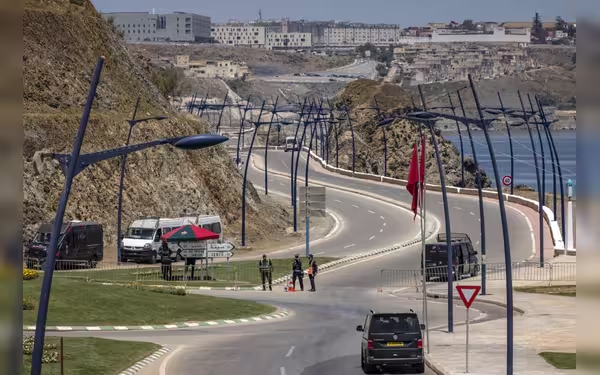Saturday, November 16, 2024 07:31 PM
Morocco Thwarts Mass Migration Attempt to Ceuta
- Moroccan authorities prevent mass migration into Ceuta.
- Increased security measures in Fnideq to deter crossings.
- Over 45,000 migrants stopped in 2023.
 Image Credits: arabnewspk
Image Credits: arabnewspkMoroccan authorities successfully thwart a mass migration attempt into Ceuta, enhancing security measures and arresting inciters.
In recent times, the issue of migration has become a pressing concern for many countries, particularly those situated at the crossroads of continents. One such location is Morocco, which serves as a gateway for migrants seeking to reach Europe. The Spanish enclaves of Ceuta and Melilla, located on Morocco's Mediterranean coast, represent the only land borders between the European Union and Africa. These enclaves have witnessed numerous attempts by migrants to cross into Europe, often leading to tense confrontations with local authorities.
On Sunday, Moroccan authorities took decisive action to thwart a mass migration attempt into Ceuta. Following calls on social media, dozens of migrants gathered in Fnideq, a town near the border, and attempted to storm the border fence. Reports indicate that these individuals began throwing stones at Moroccan security forces, who were quick to respond and prevent any further escalation. Videos circulating on local news websites captured the chaotic scene, highlighting the desperation of those seeking a better life.
In a proactive measure, Moroccan authorities had already arrested at least 60 individuals the previous week for inciting others to attempt a mass crossing via social media. This crackdown reflects a broader strategy by Moroccan security forces, who have significantly increased their presence in Fnideq since Friday. Mohammed Ben Aissa, a local human rights activist, noted, "This is the heaviest security deployment ever in Fnideq, with authorities acting pre-emptively by setting up multiple checkpoints on roads to northern Morocco." This heightened security has led to the transportation of hundreds of would-be migrants away from the area.
The demographic of these migrants is predominantly young Moroccans, although a smaller number from sub-Saharan Africa also seek to make the perilous journey. Many of these individuals arrive on foot and attempt to hide in nearby forests to evade detection by authorities. Zakaria Razzouki, another rights activist, explained that Moroccan security forces are actively working to prevent crossings at the land border and patrol the beaches to stop migrants from swimming to Ceuta.
Despite the challenges, the issue of illegal migration remains a significant concern for both Morocco and Spain. Since resolving a diplomatic dispute in 2022, the two countries have strengthened their cooperation in tackling this complex issue. According to figures from Morocco's interior ministry, the country has successfully stopped 45,015 individuals from illegally migrating to Europe in the first eight months of this year alone. However, the situation remains fluid, as evidenced by a recent incident where hundreds of migrants took advantage of thick mist to swim to Ceuta.
The tightening of surveillance along Morocco's northern borders has led many migrants to seek alternative routes, with an increasing number attempting the longer and riskier journey to the Canary Islands. This shift underscores the desperation faced by those seeking a better future, as well as the ongoing challenges that both Morocco and Spain must navigate in addressing the complexities of migration.
The situation at the Moroccan-Spanish border serves as a stark reminder of the lengths to which individuals will go in search of a better life. As countries grapple with the realities of migration, it is crucial to foster dialogue and cooperation to address the root causes of this phenomenon. Understanding the motivations behind migration can lead to more effective policies and ultimately, a more humane approach to those seeking refuge and opportunity.













